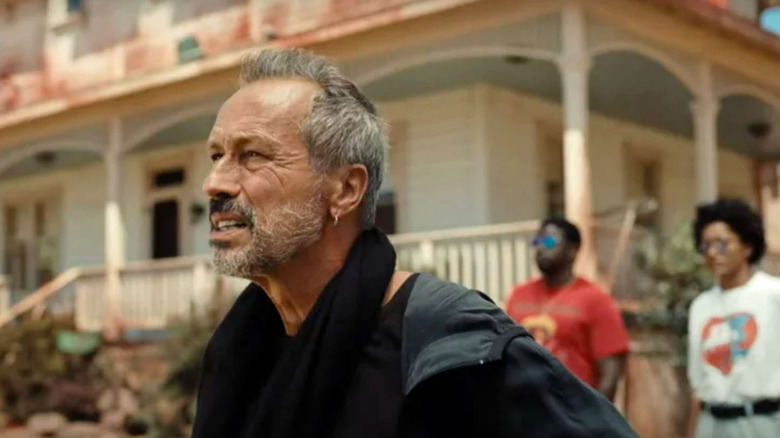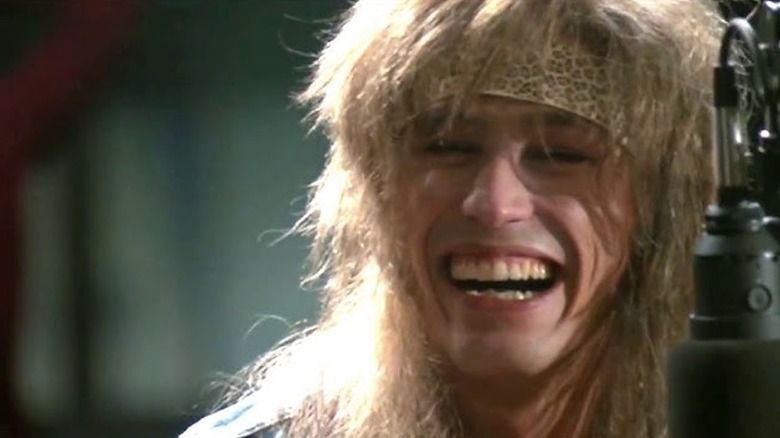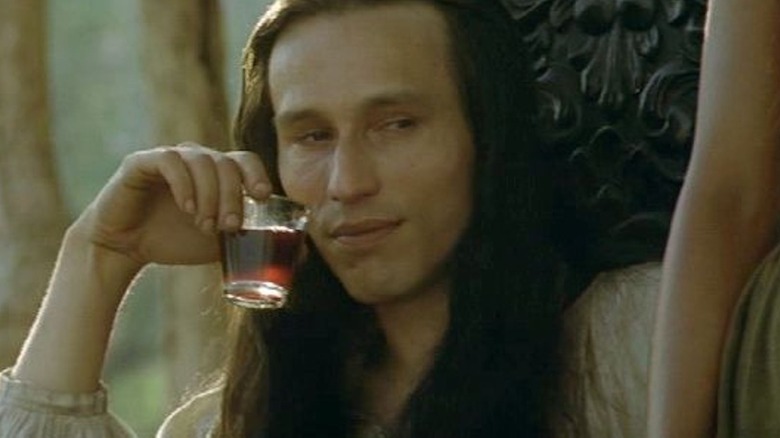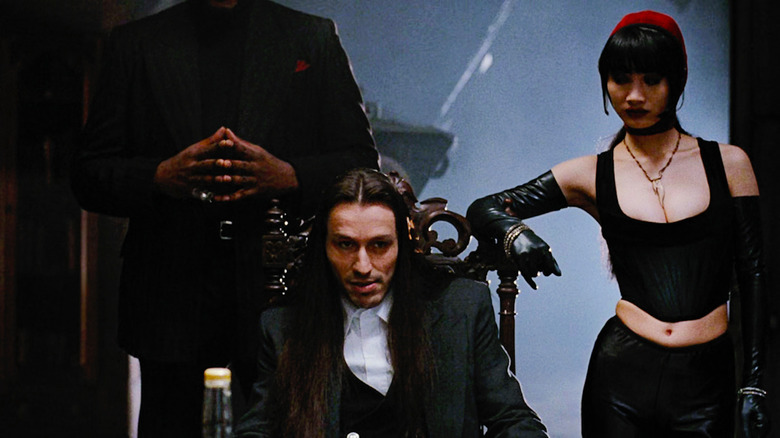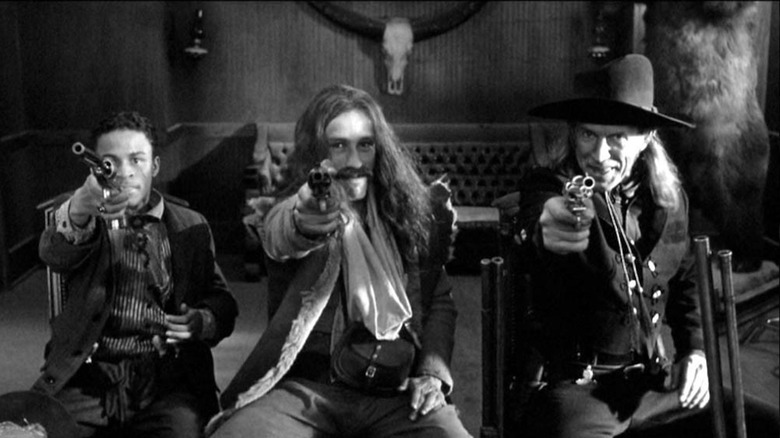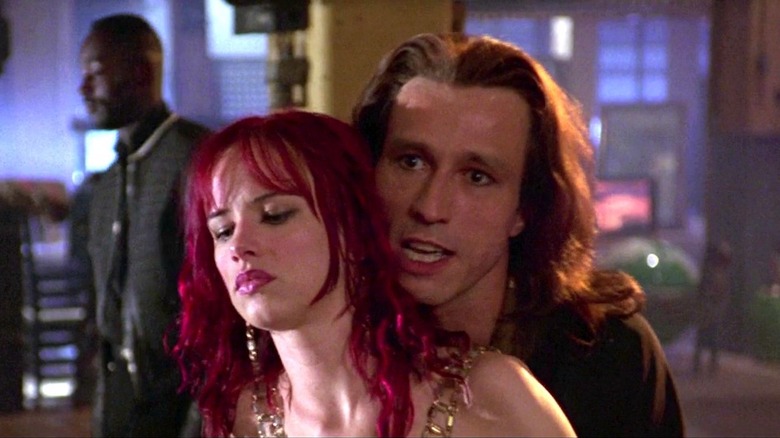5 Best Michael Wincott Roles To Watch After Nope
I know how you feel. You just walked out of Jordan Peele's "Nope," and as you sort through your take on the filmmaker's latest genre provocation, you find yourself gripped with the desire to pump more Michael Wincott into your movie-mad veins. This is understandable. This is sane. This is right. Sooner or later, everyone comes to the realization that Michael Wincott is one of filmdom's most delectable character-actor delicacies. That rasp, that devilish gaze ... can we talk more about that rasp?
Wincott hasn't exactly been a well-kept secret, but he's had a bad habit of blowing it out in box-office disappointments. That these films missed with audiences wasn't his fault. Wincott, if he deigns to work with you, always brings that sleazy-sexy thing. His characters might be rotten for your mental and physical health, but if you've gotta have a vice, Wincott's one helluva narcotic.
With "Nope" poised to drive a new generation of worshippers to the First United Church of Wincott, please allow me, an early adopter of the creed, to get you hooked on the goods.
Talk Radio (1988)
The Toronto-born Wincott had appeared in a number of Canadian films during the late-'70s and early-'80s, and popped as the doomed, mobbed-up owner of a literal spaghetti factory on the "Bread and Roses" episode of "Miami Vice," but it was his unsettling turn as the deranged fan of Eric Bogosian's shock jock Barry Champlain in "Talk Radio" that put him on the map as a character actor.
Champlain courts disaster when he invites Wincott's Kent into the studio for a live, on-air appearance. The DJ's been receiving death threats, and this unvetted lunatic is all over the map. Wincott plays Kent as a psychotic Steven Tyler. He's a harmless goof when waxing rhapsodic over Bruce Springsteen's model wife Julianne Phillips, but turns volatile when he rages about corporate control of the populace. Champlain hurls nonstop, condescending insults at Kent, and due to Wincott's unpredictably manic energy, we can't tell if or when he might snap and attack his trash-talking hero. Director Oliver Stone frames him so unnervingly tight, that the acrid scent of stale cigarettes and cheap booze wafts off the screen.
Wincott dominates every second of this encounter. Unsurprisingly, Stone brought him back for "Born on the Fourth of July" and "The Doors."
1492: Conquest of Paradise (1992)
Wincott's capacity for exuding cruelty is on full, hissable display in Ridley Scott's Christopher Columbus biopic, "1492: Conquest of Paradise." As the famed explorer's mutinous commander, Wincott simmers and sneers like he's the second coming of Basil Rathbone's Guy of Ginsbourne from "The Adventures of Robin Hood." The film is always visually stunning, but only occasionally involving. Aside from Vangelis's invigorating score and Adrian Biddle's captivating cinematography, Wincott's the liveliest element in the film. The scene where he hacks off an Indigenous Lucayan's arm for allegedly stealing gold solidifies our sympathies with the wavering Columbus (a strangely uncompelling Gérard Depardieu). Without his delicious villainy, Scott's epic would be a hollow, picturesque bore.
The Crow (1994)
Wincott finally gets to play the main heavy in "The Crow," and he is unfathomably evil as Detroit crime boss Top Dollar. Wincott puts the whole package to work: the gravelly voice and that come-hither-if-you-dare (and you ought not) sexuality has never been more intoxicating.
The film ups the perverse ante by thrusting him into an incestuous relationship with his half-sister (Bai Ling), and you're still powerless to resist this cretin's appeal. Their introduction — where Top Dollar gazes upon the lifeless body of an unfortunate threesome participant and sighs, "I think we broke her" — was shockingly depraved in 1994 and would be unthinkable in a mainstream comic book movie now. The film is irrevocably stained by the negligent on-set killing of star Brandon Lee, so this is a hard movie to watch, much less defend. Perhaps that's why Wincott didn't rocket to the top of filmmakers' villain wish lists. He was primed for stardom, and for whatever reason, retreated to character-actor work.
Dead Man (1995)
Wincott's Conway Trill is one of three (supposedly) highly skilled killers hired by moneyed industrialist Robert Mitchum to find and kill the man (Johnny Depp) who murdered his dirtbag son (Gabriel Byrne).
Wincott is perfectly suited to Jim Jarmusch's droll aesthetic. He's basically working a dialed-back variation on Roberto Benigni's wild-card character in "Down by Law." Trill is a loquacious idiot who verbalizes every fool notion that pops into his mind. Jarmusch cannily uses Wincott to transition away from Depp's narrative, leading off scenes with non-sequitur observations like, "Ever wish you were the moon?" or "Rome weren't built in a day, Cole. 'Course, I wasn't overseein' that particular job."
It's amazing a man this scatterbrained ever succeeded as a hired killer, and once he meets his fate at the bottom of Lance Henriksen's tummy, we can't help but wonder if his exploits were, like everything else that dribbles out of his mouth, a bunch of hooey.
Strange Days (1995)
When you can't get Bono, you go with Wincott. Actually, even if you can get Bono, why the hell aren't you going with Wincott? The role of Philo Gant, a super-skeezy music producer looking to make a fortune off his murdered hip-hop collaborator, would've played like sanitized evil in the hands of a global, image-obsessed rock star like Bono. He could've never convincingly burrowed into the industry muck to which he owes his gilded career. Wincott? Drape a sweat-soaked robe decked out with gaudy gold piping on my man, and he'll give you the willies for days.
Released in 1995, Kathryn Bigelow's "Strange Days," conceived by James Cameron and co-written with Jay Cocks, used the 1992 Los Angeles Riots as a precursor to a turn-of-the-millennium reckoning. It's a dazzling parade of scumbag characters (Tom Sizemore, Richard Edson, and William Fichtner get in on the down-and-dirty fun), but Wincott out-scuzzes them all as the drugged-out, amoral Gant.
